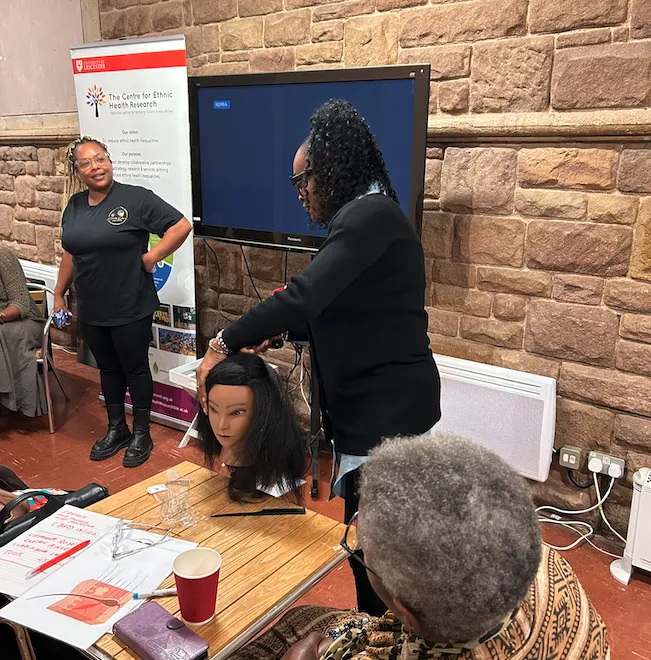
Sista Strands is a new five-week programme offering Black women aged 40 to 60 a safe space to explore the connections between their hair, identity and health while raising awareness of autoimmune diseases – conditions that disproportionately affect them.
Developed by the Centre for Ethnic Health Research (CEHR), the project also addresses the underrepresentation of Black women in research and encourages open and supportive conversation.
Every Tuesday evening until November 4 at St Peter’s Church in Leicester, middle-aged Black women are invited to a series of interactive sessions blending haircare education with health awareness. Through storytelling, culturally tailored haircare workshops and group discussions, participants can recognise symptoms, share experiences and take charge of their wellbeing.
One session includes a talk by Dr Veena Patel, Rheumatology Consultant at University Hospitals Leicester, while another will welcome a researcher to discuss how the Black community are underrepresented in research. The programme will conclude with a celebratory photoshoot, showcasing the strength, beauty and community of Black women.
Sista Strands is supported by the NIHR ARC East Midlands.
Fiona Hutchinson, Community Engagement Officer for the CEHR, said: “Sista Strands is about reclaiming our stories. It gives Black women the space to be seen, heard and empowered when it comes to their health.
“For too long, the experiences of Black women have been overlooked in conversations about autoimmune diseases, despite the impact these conditions have on our community. This project brings those conversations to the forefront in a setting that feels familiar, safe and uplifting.”
She added: “By connecting discussions about beauty, wellbeing and identity, we are helping women to recognise the signs of illness earlier, feel confident to seek support and challenge the stigma that can surround invisible health conditions.
“Sista Strands celebrates strength and sisterhood, showing that when we come together, we can rewrite the narrative around our health and our futures.”
Professor Kamlesh Khunti, Director of the CEHR and Co-Director of the NIHR ARC East Midlands, said: “Projects like Sista Strands demonstrate the vital role of community-led research in addressing health inequalities. By creating a space where culture and science meet, we are able to reach people in ways traditional healthcare settings often cannot.
“Raising awareness of autoimmune diseases among Black women is not just about improving early diagnosis, it is about ensuring that research, education and care reflect the diversity of the communities we serve.”
He concluded: “Initiatives like this are essential if we are to build a fairer, more inclusive health system for everyone.”
The Sista Strands sessions launched on Tuesday, October 7, and will take place every Tuesday until Tuesday, November 4, at St Peter's Church, 2 St Peter's Road, Highfield, Leicester, from 6pm to 8pm. Attendance is open to all, and no prior registration is required.
Black History Month is observed in the UK every October and celebrates the achievements, history and contributions of Black people.
The CEHR works to address inequalities, associated with ethnicity, in health care access and health outcomes. The CEHR is hosted by the University of Leicester within NIHR ARC East Midlands – the lead ARC for Equality, Diversity and Inclusion of under-represented groups in research.
